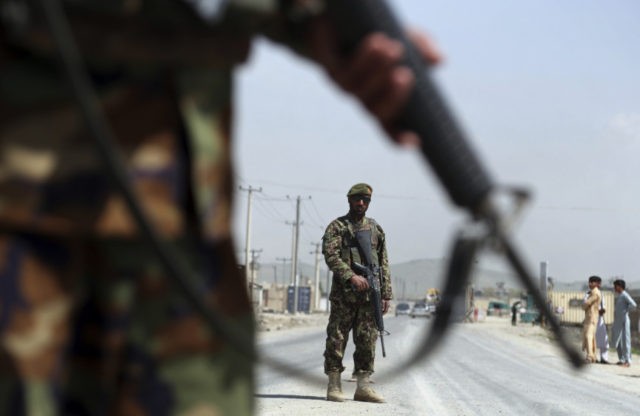President Ashraf Ghani of Afghanistan announced on Monday the release of nearly three dozen Taliban prisoners in a bid to convince the reluctant terrorist group to engage in peace negotiations with Kabul.
In a statement issued August 12, the National Directorate of Security (NDS), Afghanistan’s primary intelligence agency, revealed that Kabul set free 35 Taliban prisoners “as a gesture of goodwill.”
“The release of these prisoners is a clear sign of the strong will of the government for peace and end to war”, the NDS declared, the Agence France-Presse (AFP) news agency reports.
President Ghani has released hundreds of Taliban narco-jihadis in recent months to convince the terrorist organization to engage in peace negotiations with Kabul, to no avail.
In June, the Afghan government released 490 Taliban prisoners and is expected to release hundreds more in the coming months.
Referring to the recent release of Taliban prisoners, Afghanistan’s Khaama Press (KP) notes, “The National Directorate of Security said it urges the released inmates not to be deceived by enemies and refrain from cooperation with the enemies of peace and stability of the country.”
Taliban narco-jihadis have repeatedly rejected Kabul’s U.S.-backed offers of peace and legitimacy as a political group.
Legitimacy would grant the Taliban the opportunity to return to power in Kabul. Soon after invading Afghanistan in the wake of the September 11 attacks, the U.S. removed the Taliban regime from power for harboring al-Qaeda.
Under the potential U.S.-backed peace pact, Afghanistan could find itself in the same situation it was in when the war began — under Taliban rule. Only this time, U.S. nation-building funds could continue to flow into Afghanistan while the Taliban rules the country.
The Taliban has repeatedly said it is fighting to establish a sharia-compliant Islamic emirate.
Amid the peace negotiations, the Taliban continues to generate millions from trafficking and cultivating opium and its heroin derivative, some of which is fueling the deadly opioid crisis in the United States. It is unclear if U.S. peace negotiators are pushing the group to cut its ties to the opium trade.
Under the previous U.S. administration, Taliban manpower and influence reached unprecedented levels. The group now controls or contests about half of Afghanistan, more than during any other time since U.S. troops removed it from power in late 2001.
For over a year, the U.S. and the Taliban have been trying to negotiate a peace pact in Afghanistan. However, the narco-jihadi group continues to refuse to engage in discussions with the Ghani administration. Instead, he Taliban has stepped up attacks against U.S. troops as well as Afghan security forces and civilians during the peace negotiations.
KP reports that President Ghani set free the 35 Taliban prisoners amid the Eid Al-Adha (“Festival of the Sacrifice”) Muslim holiday, noting, “The National Directorate of Security said in a statement that the directorate released 35 inmates based on a presidential decree which was issued on the occasion of Eid Al-Adha.”
Ghani’s decision to release more Taliban prisoners came on the heels of the eighth round of U.S. talks with the terrorist group, which failed to produce an official peace pact.
On Monday, Zalmay Khalilzad, the top U.S. negotiator, wrote on Twitter:
We’ve concluded this round of talks that started Aug 3 between the US and the Taliban. Over the last few days, the two sides focused on technical details. They were productive. I am on my way back to DC to consult on next steps.
We've concluded this round of talks that started Aug 3 between the US and the Taliban. Over the last few days, the two sides focused on technical details. They were productive. I am on my way back to DC to consult on next steps.
— U.S. Special Representative Zalmay Khalilzad (@US4AfghanPeace) August 12, 2019
Negotiators are focused on finalizing an agreement to withdraw U.S.-led foreign forces in exchange for Taliban counterterrorism guarantees.
The Taliban has promised to prevent Afghanistan from continuing to harbor international terrorist groups like al-Qaeda and the Islamic State (ISIS/ISIL). According to the United Nations, however, the Taliban-al-Qaeda relationship remains strong more than 18 years after the U.S. invaded Afghanistan in response to the terrorist groups’ role in the September 11 attacks.
Taliban jihadis have come out against U.S. proposals to leave behind a residual force to ensure the terrorist group keeps its promises.
The Trump administration has made the political reconciliation between the Afghan government and the Taliban the primary tenet of its strategy to end the war. Trump administration officials have conceded that a military victory is impossible at this point.
The U.S. has devoted an enormous amount of blood and treasure to the war in Afghanistan — nearly $1 trillion, 2,291 U.S. military deaths, and 20,481 injuries.

COMMENTS
Please let us know if you're having issues with commenting.